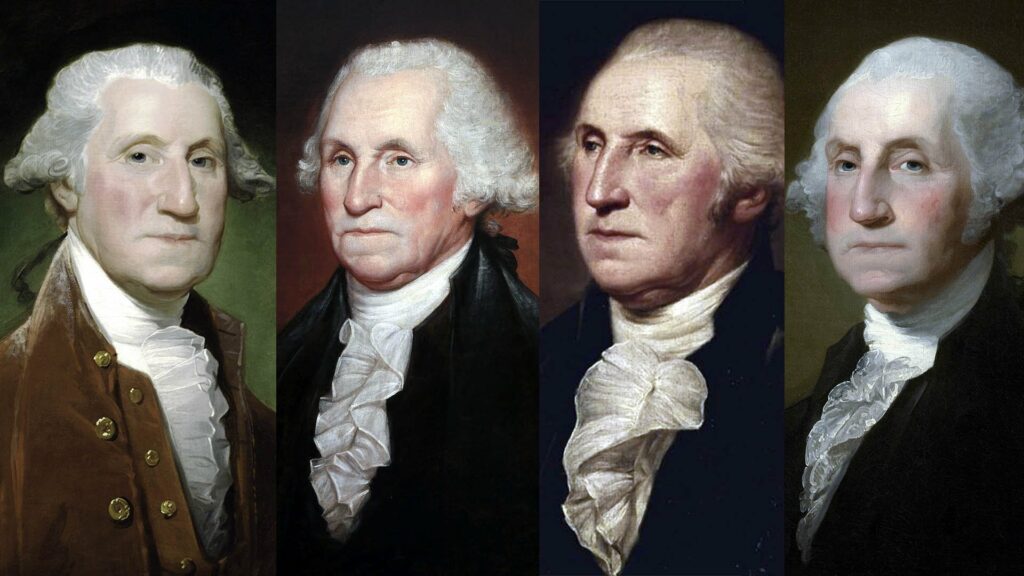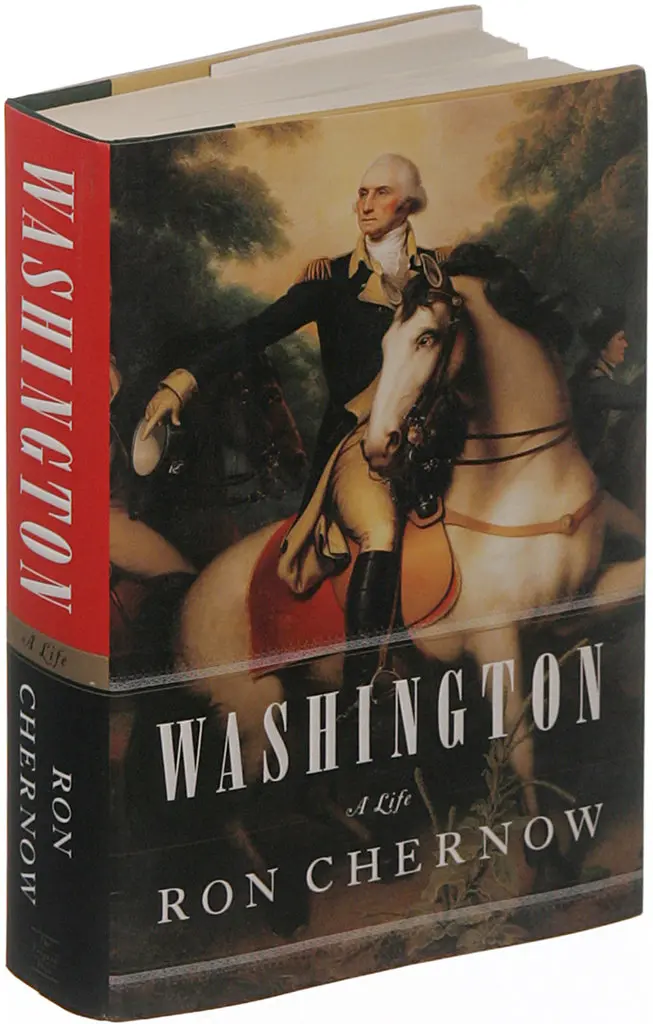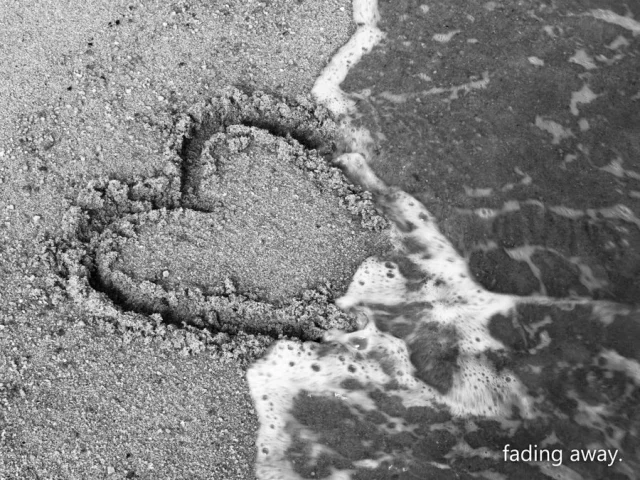George, like most humans, was a bundle of contradictions.
- He was both a freedom fighter and a slave owner.
On more than one occasion, George said something to the effect, “If we let the British continue to push us around, then soon we will be to the British what our slaves are to us.”
British infringement on colonial freedom was so entirely intolerable for George that he engaged in a protracted ten-year war to throw it off. Despite this insatiable desire for freedom, it didn’t dawn on him that his own human property might feel the same towards him as he did towards the British. George owned as many as 317 slaves at one time. Over the course of his career as a plantation owner, 27 ran away. He tried to recapture them and was confounded as to why they might want to flee. He fed, clothed, and housed them; unlike most plantation owners, he also spent money on doctors to keep them healthy. He magnanimously blessed slave marriages and refused to break up slave families, something not many plantation owners were willing to do in the 1700s. In his mind, he was a self-sacrificing, fair-minded slaveholder, and his slaves ought to be grateful.
Over time, George came to see that there was no economic benefit to having slaves. Young slaves and old slaves couldn’t work well and became an expense without benefit. Healthy slaves, to Washington’s incredulity, wouldn’t work to their full potential unless closely monitored by paid slave masters. George could see that slaves were more trouble economically than they were worth. Additionally, deep down in George’s soul, he must have felt a moral unease about the practice. — though almost nothing in his journals confirms this. In death, he freed all of his slaves and set up a fund to help educate them so they could succeed as free people — much to the shock and consternation of his fellow Virginian plantation owners
- He was both extraordinarily charitable and tight-fisted.
George constantly gave his money away to help orphaned children of the war or disenfranchised people get back on their feet. At Mount Vernon, he spent himself into poverty by practicing hospitality. He made sure his closest body slaves had the best clothing. As president, he always seemed to be handing over personal funds to help those in need. He refused to take a salary for being the Continental Army general or the United States president. He was so generous with his money that when it came time for him to travel to Philadelphia to take up his first term as president, he had no money left and had to take out a loan to transport himself there. George felt keenly the financial strain put on him. His plantation was never solvent, and he was always away serving his country, so he could not avert the failing trajectory of his farm. In his personal business, he was harsh with slaves, employees, and vendors. He drove a hard bargain and could be vicious in arguing over pennies. Money was tighter than it needed to be because George wanted to have the image of a wealthy land-owning gentleman. For the sake of his image, he could not afford to cut corners on generosity and appearance, but for the sake of his bottom line, he couldn’t afford not to. The pressure of this dilemma found its outlet on the poor people who were connected to him in business.
- He was both the hero of the American Revolution and an incompetent general.
Napoleon won 53-60 battles in his lifetime. (Click to see my review of Napoleon the Great.) He was a bonified military genius. George was not. One can almost argue that George never won a battle in his life! Certainly not a major one. Even George’s crowning military achievement, the defeat of the British at Yorktown, would have been an absolute tragedy had he been able to implement his strategy on the British. Mercifully for George and the American cause of freedom, the French arrived just in time to prevent what would have been an unmitigated disaster for the American side. After tisk-tisking George, the French took over military operations and won the day.
Over the course of the war, why wasn’t he defamed and sacked? In a word, George was the glue. His ability to hold a rag-tag, underpaid, under-equipped, under-trained, half-interested pack of disorganized militias together in the most inhospitable of conditions is nothing short of miraculous. In addition to this impossible task, he also managed to keep the politicians and leaders of 13 very divided colonies united just enough to outlast the will of the British. No one on earth in the mid-18th century would have ever imagined the Americans could have won this struggle. But George’s letters, speeches and tireless leadership coalesced into a sticky, intangible substance that held the dream of freedom together for the American people when everything was positioned to blow it apart. That, and he was really good at retreating from the British, dodging them just long enough so he could stay alive. Eventually, the mighty British empire did a “cost-benefit analysis” and decided the colonies were more trouble than they were worth. Without George at the helm, there would have been no victory.
- He was both ambitious and longed for anonymity.
In letters and conversations, George wanted to be done with public service. He wanted to run his farm in peace and quiet. To be a private citizen seemed to be his highest goal. He resigned his generalship and moved back to Mount Vernon as soon as possible. He didn’t want to be President for his first term; for his second term, he returned only after unyielding arm twisting and the false promise that his services would only be needed for a year or two. He hated crowds and parties in his name. Often, he would leave a city before daybreak or take a circuitous route to arrive at his destination to avoid fanfare. But George also meticulously kept every scrap of communication he ever wrote. He was obsessed with keeping a record of his life for posterity. He sat for more portraits of himself than virtually anyone of that time. George knew he was a great man. He didn’t turn away from comments like “You are the father of our country.”

- He was both stand-offish and deeply affectionate.
George was not the “warm fuzzy” type. He was big and strong, hard-working; he was naturally a man of few words. He led by example, and he expected much from those around him. He was not given to displays of affection. Indeed, many criticisms of his formal, stiff, and socially awkward ways exist. However, some situations of deep affection come up in his life at critical moments. His beautifully affectionate treatment of women, his care for the suffering, his written affection for his lifetime friends and his overwhelming love for the American people, in general, all counterbalance his stand-offishness.
What made him so successful? What turned him into the towering superhero of the American people?
- He remained impervious to the corrupting influence of power and fame. He had it all. He could have become a dictator or a tyrant king. He could have used his power for ruthless self-interest. He could have destroyed his political enemies. He could have used his position to take advantage of people, accrue wealth, bend the truth, or enjoy unrestricted sexual pleasure. (Women loved George!) But he avoided all of the natural pitfalls of fame and power. In all my studies of great people, I have found that very few can resist the destructive influences of unrestricted power and fame. George is in small company indeed. The American people knew they could trust George. He wasn’t going to deceive them or be self-serving in any way. He was always going to act in the best interest of the American people, and that’s why they loved him then and do to this day.
Other interesting facts about George:
- He loved women for all the right reasons. He was a true gentleman.
- He was a great dancer.
- He loved the theatre even though it was more of a taboo thing in the 1700s.
- He was a physical specimen: 6 foot 1, 225 lbs, solid muscle.
- He was ultra concerned about his image. He had to have the best horses, carriages, and clothes. He would write intense, almost OCD letters to overseas vendors urging them to procure items like buttons, shoes, and plates of the highest fashion. Even in the Whitehouse, he was almost maniacal about the look of things; The highest quality and the highest fashion (at the lowest price) were paramount to him.
- All George ever wanted to be was a respected English gentleman. If the British had given that to him when he was a British army colonial officer, there would never have been a war.
- George had terrible teeth. He spent a small fortune on dentures to try to correct the problem. Since image was such a high priority for him, this problem was nothing short of catastrophic.




